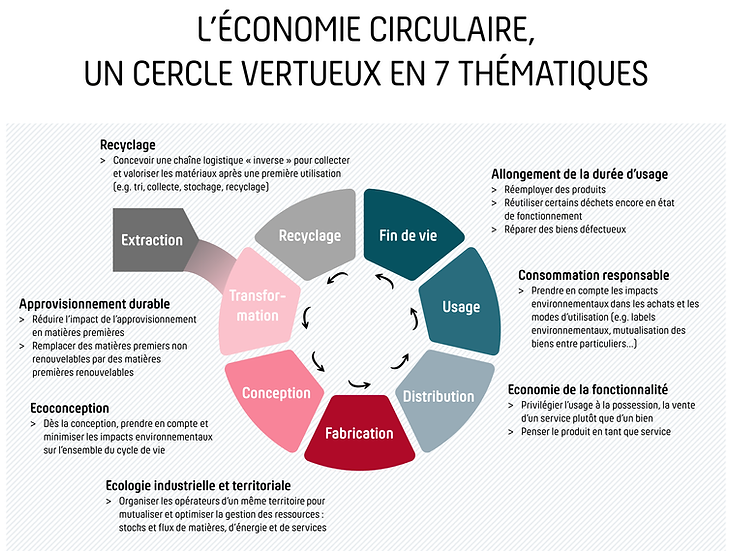
Circular economy
Another growth paradigm : get ahead of the standards to take advantage of them
Romain Launay, Director
Decoupling growth from the depletion of resources… ultimately means rethinking the value chain of consumer goods with the aim of optimizing their use but also creating new activities. At the heart of the circular economy thus emerges a completely different growth paradigm. More than a response to regulatory and societal pressure, it is a new way to build the future.
A revolution that affects all sectors
While manufacturing is at the forefront, the circular economy is actually a deeper mindset shift. It is revolutionizing the production of goods and services, with the adoption of new practices for oneself, the company and the company's customers.
From financial services players (roles in platforms for the exchange of second-hand goods, support for their corporate clients in their development within the circular economy, etc.) to FMCGs, including the real estate industry and construction / renovation (eco-design, more virtuous construction processes, sustainable supplies, development of sites and integration for the benefit of territorial ecology, sorting and recycling of waste, etc.), all have a role to play and development opportunities to be built.
A source of innovation and performance, the circular economy is conducive to the reinvention of economic models
When an actor looks at his activities through the filter of the 7 themes of the circular economy, he identifies new business opportunities for each.
For example, the extension of the lifespan becomes a strong marketing argument in the conquest of market shares ; the creation of second-hand product lines is becoming a new activity in its own right. It is in this sense that IKEA has opened its first refurbished furniture store, that SEB is marketing refurbished products, that the fashion sector is embarking on the sale of second-hand products (from possession to use).
In addition, by implementing circular economy principles, companies can achieve substantial gains. The Ellen MacArthur Foundation has estimated the possible economic gain at 1.8 trillion euros per year from 2030 in Europe, in particular for companies, notably via :
New sources of revenue and new business models (services, waste recovery, sale of spare parts, etc.)
A reduction in exposure to the risk of volatility of raw materials (security of supplies, etc.)
A differentiating factor for consumers (responsible branding, new ranges, etc.)

Driver of differentiation and attractiveness in the market, the adoption of circular economy practices is a response to the growing awareness and demand of consumers in terms of sustainable development.
Consumers (companies and individuals) are more and more inclined to favor the use of sustainable and responsible products. 73% of European consumers say they are ready to change their consumption habits to reduce their environmental impact :
-
Take-off of bulk, appetite for recycled materials
-
Trivialization of the occasion, repair practices and recovery
-
Sorting and recycling of waste
-
…
Finally, rather than being subject to current and future regulatory constraints, it's about getting ahead of the standards to take advantage of them.
Due to the climate emergency and societal pressure, European and national directives – in particular, EPR (Extended Producer Responsibility), which since its introduction in the 1980s has become increasingly widespread – are putting companies under pressure.
Political decision-makers are constantly tightening regulations vis-à-vis companies in terms of environmental protection and the circular economy.
Preparing for the coming revolution !
The circular economy is a ground swell comparable to that caused by digital in the 2000s. It encourages coopetition (collaboration between players in the same sector to, for example, consolidate collection flows of products to be recycled or develop new industrial recycling processes) and collaboration between players in the same ecosystem (producers / suppliers / distributors / operators / public authorities) or even territorial ecology.
It is essentially a systemic approach, calling on specific and targeted know-how capable of carrying out both strategic and cultural transformations, of resolving on the ground the technical complexity induced by the circular economy and of generate constructive dialogue among multiple stakeholders. It is in this sense that we support our clients in seizing the subject, detecting opportunities and activating the right levers: designing new industrial processes, deploying environmental strategies, bringing new competitive advantages to their company, their sector, its territory and reinvent its economic models. But in a more aspirational and unifying way, it is to contribute to the construction of a new world.
Sources : Gouvernement.fr, Ec.europa.eu, The Conference Board® Global Consumer Confidence Survey, Q2 2017, Circular Economy Observatory 2019